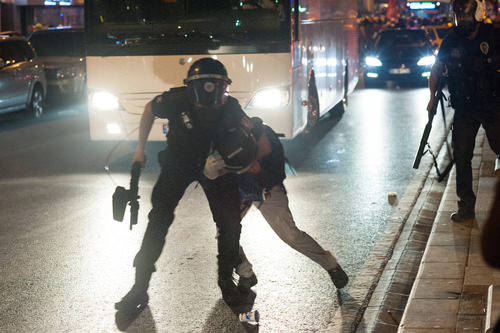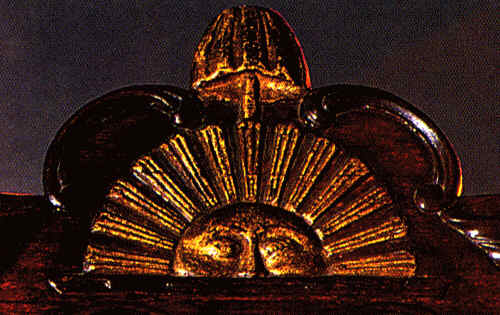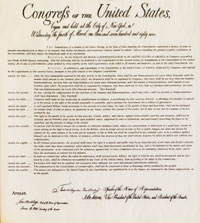2.9: Freedoms and Rights Guaranteed by the Bill of Rights
- Page ID
- 5832

A New Era
On September 17, 1787, after 16 weeks of deliberation, the final draft of the United States Constitution was signed by 39 of the 42 delegates present. James Madison reported that Benjamin Franklin, while pointing to the image of a half-sun painted on the back of George Washington's chair, said:
I have often in the course of the session...looked at that [chair] behind the president, without being able to tell whether it was rising or setting; but now, at length, I have the happiness to know that it is a rising, and not a setting, sun.

With the Convention officially ended, the members "adjourned to the City Tavern, dined together, and took a cordial leave of each other." However, the struggle for a new Constitution was not over. In fact, many would say it was just beginning. The next important step was to win the consent of popularly elected state conventions. At least nine states would need to ratify the new Constitution before the document could become effective.
Federalists and Anti-Federalists.
By June 1788 the required nine states had ratified the new Constitution, but the largest states, Virginia and New York had not yet done so. Two states, North Carolina and Rhode Island, flatly refused to participate in the ratification process. Popular sentiment was that without the support of these crucial states, the Constitution would never be honored. In the eyes of many people, the document seemed full of potential problems and dangers--including a fear that the new federal government would use its strong central power to “tyrannize them” as Britain had done just a few years earlier. Another fear was that they would be burdened with oppressively heavy taxes and dragged into wars by the new government and its armed forces.
The essays, published in New York newspapers, provided a now classic argument for a central federal government with separate executive, legislative, and judicial branches that provided checks and balances for each other.
In Virginia, the Anti-Federalists attacked the proposed new government by challenging the opening phrase of the Constitution: "We the People of the United States." Without using the individual state's name in the Constitution, the delegates argued, the states would not retain their separate rights or powers. Virginia Anti-Federalists were led by Patrick Henry who became the chief spokesman for back-country farmers who feared the powers of the new central government. Wavering delegates were persuaded by a proposal that the Virginia Convention recommend a Bill of Rights. Anti-Federalists joined with the Federalists to ratify the Constitution on June 25. With The Federalist Papers influencing the New York delegates, the Constitution was ratified on July 26.
Fear of a strong central government was only one concern among those opposed to the Constitution. Of equal concern to many was the fear that the Constitution did not protect individual rights and freedoms sufficiently. Virginian George Mason, author of Virginia's 1776 Declaration of Rights, was one of three delegates to the Constitutional Convention who refused to sign the final document because it failed to list and specifically protect civil liberties. Together with Patrick Henry, he campaigned vigorously against ratification of the Constitution by Virginia. Indeed, five states, including Massachusetts, ratified the Constitution on the condition that a Bill of Rights be added immediately.
When the first Congress convened in New York City in September 1789, the calls for a series of Constitutional amendments protecting individual rights were virtually unanimous. Congress quickly adopted 12 such amendments. By December 1791, enough states had ratified 10 of those amendments, creating the Bill of Rights. Among their provisions: freedom of speech, press, religion, and the right to assemble peacefully, protest and demand changes (First Amendment); protection against unreasonable searches, seizures of property and arrest (Fourth Amendment); due process of law in all criminal cases (Fifth Amendment); right to a fair and speedy trial (Sixth Amendment); protection against cruel and unusual punishment (Eighth Amendment); and provision that the people retain additional rights not listed in the Constitution (Ninth Amendment).
Since the adoption of the Bill of Rights, only 17 more amendments have been added to the Constitution. Although a number of the subsequent amendments revised the federal government's structure and operations, most followed the precedent established by the Bill of Rights and expanded individual rights and freedoms.
|
Issue |
Federalists |
Antifederalists |
Explanation |
|
Establishment of a Strong Central Government |
Favored |
Opposed |
Antifederalists were worried that the states would lose power as the national government’s power grew. |
|
States’ Rights (Power to the 13 Individual States) |
Favored limitations on state power. Argued that the new Senate (with two representatives per state) adequately represented state interests. |
Wanted protections for states’ rights and more power to the individual states. |
Local autonomy and control was key to the Antifederalist concept of democracy. This issue would boil up in states’ rights fights in the 1800s |
|
Bill of Rights |
Not necessary |
Supported as essential |
Even the largest of states (New York and Virginia) agreed that the absence of a Bill of Rights in the original Constitution was a threat to individual citizens’ liberties |
|
Articles of Confederation |
Opposed as ineffectual as being ineffective. Congress had no power. All power was in the hands of the states. |
The Articles of Confederation needed to be amended, not abandoned |
The decision at the Annapolis Convention (1786) to suggest a national convention to modify the Articles proved to be crucial. |
|
Size of the nation |
A large republic was seen as the best protection for individual freedoms |
Only a small republic could protect rights |
The new federal republic would be a “laboratory of Democracy.” No new system of democratic government on the scale of America’s had ever been attempted. |
|
Supporters |
Large farmers, merchants, artisans, and larger states, primarily in the North (with the exception of Rhode Island) |
Small farmers, often from rural areas and primarily in the South. |
Only a few wealthy men (Mason and Randolph of Virginia, Gerry of Massachusetts) joined the Antifederalists. |
Sources: Based on The American Journey: A History of the United States by Goldfield, et al. http://faculty.polytechnic.org/gfeld.../chart.fed.pdf
The Bill of Rights
George Mason was one of the leading figures in creating the Bill of Rights. After storming out of the Constitutional Convention because the Constitution didn't contain a declaration of human rights, he worked to pass amendments that would protect citizens from an intrusive government.
The piece of parchment that is called the Bill of Rights is actually a joint resolution between the House and Senate proposing twelve amendments to the Constitution. The final number of accepted amendments was ten, and those became known as the Bill of Rights.

In 1789 Virginian James Madison submitted twelve amendments to Congress. His intention was to answer the criticisms of the Anti-Federalists. The states ratified all but two of them — one to authorize the enlargement of the House of Representatives and one to prevent members of the House from raising their own salaries until after an election had taken place. The remaining ten amendments, known as the Bill of Rights, were ratified in 1791.
They put limits on the national government's right to control specific civil liberties and rights, many of which were already protected by some of the state constitutions. Liberties protected included freedom of speech, press, religion, and assembly (First Amendment) The Bill of Rights also provided safeguards for those accused of crimes. Two amendments — the right to bear arms (Second Amendment) and the right to refuse to have soldiers quartered in your home (Third Amendment) — were clearly reactions to British rule. The Anti-Federalists were pleased by the addition of the Tenth Amendment which declared that all powers not expressly granted to Congress were reserved for the states.
Over the years, the Bill of Rights has become an important core of American values. The compromise that created the Bill of Rights also defined what Americans would come to cherish above almost all else. Together with the Declaration of Independence and the Constitution, the Bill of Rights helps to define the American political system and the government's relationship to its citizens.
The United States Bill of Rights:
The Preamble to The Bill of Rights
Congress of the United States begun and held at the City of New York, on Wednesday, March 4, 1789.
THE Conventions of a number of the States, having at the time of their adopting the Constitution, expressed a desire, in order to prevent misconstruction or abuse of its powers, that further declaratory and restrictive clauses should be added: And as extending the ground of public confidence in the Government, will best ensure the beneficent ends of its institution.
RESOLVED by the Senate and House of Representatives of the United States of America, in Congress assembled, two thirds of both Houses concurring, that the following Articles be proposed to the Legislatures of the several States, as amendments to the Constitution of the United States, all, or any of which Articles, when ratified by three fourths of the said Legislatures, to be valid to all intents and purposes, as part of the said Constitution; viz.
ARTICLES in addition to, and Amendment of the Constitution of the United States of America, proposed by Congress, and ratified by the Legislatures of the several States, pursuant to the fifth Article of the original Constitution.
Note: The following text is a transcription of the first ten amendments to the Constitution in their original form. These amendments were ratified December 15, 1791, and form what is known as the "Bill of Rights."
Amendment I
Congress shall make no law respecting an establishment of religion, or prohibiting the free exercise thereof; or abridging the freedom of speech, or of the press, or the right of the people peaceably to assemble, and to petition the Government for a redress of grievances.
Amendment II
A well regulated Militia, being necessary to the security of a free State, the right of the people to keep and bear Arms, shall not be infringed.
Amendment III
No Soldier shall, in time of peace be quartered in any house, without the consent of the Owner, nor in time of war, but in a manner to be prescribed by law.
Amendment IV
The right of the people to be secure in their persons, houses, papers, and effects, against unreasonable searches and seizures, shall not be violated, and no Warrants shall issue, but upon probable cause, supported by Oath or affirmation, and particularly describing the place to be searched, and the persons or things to be seized.
Amendment V
No person shall be held to answer for a capital, or otherwise infamous crime, unless on a presentment or indictment of a Grand Jury, except in cases arising in the land or naval forces, or in the Militia, when in actual service in time of War or public danger; nor shall any person be subject for the same offence to be twice put in jeopardy of life or limb; nor shall be compelled in any criminal case to be a witness against himself, nor be deprived of life, liberty, or property, without due process of law; nor shall private property be taken for public use, without just compensation.
Amendment VI
In all criminal prosecutions, the accused shall enjoy the right to a speedy and public trial, by an impartial jury of the State and district wherein the crime shall have been committed, which district shall have been previously ascertained by law, and to be informed of the nature and cause of the accusation; to be confronted with the witnesses against him; to have compulsory process for obtaining witnesses in his favor, and to have the Assistance of Counsel for his defence.
Amendment VII
In Suits at common law, where the value in controversy shall exceed twenty dollars, the right of trial by jury shall be preserved, and no fact tried by a jury, shall be otherwise re-examined in any Court of the United States, then according to the rules of the common law.
Amendment VIII
Excessive bail shall not be required, nor excessive fines imposed, nor cruel and unusual punishments inflicted.
Amendment IX
The enumeration in the Constitution, of certain rights, shall not be construed to deny or disparage others retained by the people.
Amendment X
The powers not delegated to the United States by the Constitution, nor prohibited by it to the States, are reserved to the States respectively, or to the people.

Study/Discussion Questions
For each of the following terms, write a sentence which uses or describes the term in your own words.
|
Federalists |
Anti-Federalists |
|
states' rights |
individual liberty |
- Which states refused to participate in the Ratification process and why?
- Who were the Federalists and why did they feel a large republic was the only protection of individual freedom?
- Why did the Anti-Federalists fear a strong central government?
Evaluate each of the following scenarios and determine whether or not the person involved is protected under the Bill of Rights. Then, decide which of the Ten Amendments in the Bill of Rights applies. Write a justification for your decision on each.
- Sara, an eighteen-year old college student, is arrested for stealing a classmate’s term paper and selling it on the Internet. When she appears before the judge, she asks for a lawyer to help defend her. The judge tells her if she is smart enough to be in college, she is smart enough to defend herself. Besides, she is not being charged with a felony, so the stakes are not very high. Does Sara have a right to an attorney? Which Amendment applies?
- A neighbor is suing the Joneses because a tree in the Joneses’ yard fell on their roof during a hurricane. The neighbors want the Jones family to pay $850 to have their roof repaired. Mr. Jones requests that a jury be present to hear this case. The judge says it is not necessary since the amount of the repairs is so small. Does Mr. Jones have the right to a jury trial? If so, which Amendment applies? Justify your answer.
- Carolyn is arrested for shoplifting a candy bar from a neighborhood convenience store. At trial, she is found guilty. The judge decides that the appropriate punishment is to cut off Carolyn’s hands so that she will not be able to shoplift again. Can the judge impose this punishment on Carolyn? If so, what Amendment applies?
- Mr. Reynolds, an avid hunter and law-abiding citizen with no criminal record, opens the door of his home one day to find agents from the Bureau of Alcohol, Tobacco, and Firearms outside. They inform him that certain provisions of a new federal law allow them to confiscate his rifles so that he may not engage in terrorist activities or plot against the United States government. They have no evidence that he is connected to any such activities. Can the ATF search Mr. Reynolds’ house to see if he has any weapons inside? Can they demand that Mr. Reynolds turn over his weapons to them? If so, what Amendment(s) apply?
- Juan Carlos Garcia is a 30-year-old Hispanic American who was born in the United States and is a natural born United States citizen. He reads and understands English but speaks with a heavy accent. Because of his Hispanic appearance, the police decide to pull him over for further investigation (even though he has not violated any traffic laws). When the police question him and find that he speaks with "a heavy Spanish accent," the officers decide to demand that he prove his citizenship to them or they will detain him for further investigation of illegal entry into the United States. Can the police pull Juan Carlos over and demand that he provide them with proof of American Citizenship if he committed no crime and had not violated any traffic laws? What Amendment(s) apply?
- Your science teacher asks the class to exchange papers to correct last night’s homework. Your friend, Jamie, refuses to do so and is sent to the principal. Is Jamie protected under the Bill of Rights? What Amendment(s) apply?
- Melissa is a 13-year-old eighth grader at the local middle school. A fellow student notices that she has taken a bottle marked “Tylenol” from her purse and has taken two tablets at the water fountain. Concerned, the student tells an assistant principal who then notifies the nurse and the security guard at the school. Given that the school has a zero-tolerance policy for ANY drugs (including non-prescription) on campus, they bring Melissa into the nurse’s office and demand that she hand over the bottle of Tylenol. When she refuses, they tell her that they will perform an involuntary strip search. Can the school conduct such a search for a bottle of Tylenol? If so, what part of the Bill of Rights would apply?
- Jesse, a 14-year-old student, decides to protest the war in Iraq. He wears a T-shirt to school with a picture of the White House and the caption “Weapon of Massive Misinformation” His principal pulls Jesse aside and asks him not to wear the shirt again because it is disruptive to the learning environment. Jesse wears it the next week and is suspended from school for three days. Is Jesse protected by the Bill of Rights? What specific amendment(s) would apply?
- Sixteen-year-old Ryan is the captain of the football team. Before the Friday night game, he and his teammates are required to submit to a drug test. Ryan’s test shows traces of marijuana. He is not allowed to participate in the game and he is suspended from school. Is Ryan protected? What specific Amendment applies?
- A known drug dealer is arrested for suspected connections to an inner city murder. The police do not inform him of his rights and immediately begin to interrogate him. They continue until he admits he knows the victim of the crime and was in the neighborhood where the murder took place. Can the police use any of his confession against him in court? If not, what specific Amendment(s) would protect the drug dealer?
- Your parents are very religious people, but you are not. Today, your parents are going to a service at their place of worship and they expect you to come along. You refuse. They make you come anyway and they ground you for the following month. Are you protected under the Bill of Rights? If so, which specific Amendment(s) would apply?
- A representative for the City of El Paso comes to your door with an eviction notice stating that your property is being condemned in order to build a new drainage collection pond because of flooding coming from the Freeway nearby. He tells you that the city will reimburse you for the fair market value of your home and your moving expenses. Can the city require you to leave your home? What specific Amendment(s) would apply here?
- Because of the budget deficit, the United States government is looking for ways to cut costs. They have announced a plan during peacetime to house unmarried soldiers in the homes of American citizens who do not have children. Is this a Constitutional act? What specific Amendment(s) would apply here?
- Because Members of Congress are unhappy with students’ standardized test scores in many states, they pass a federal law that abolishes local school boards and requires a standardized national curriculum with frequent testing of every subject at every grade level. Is this Constitutional? What specific Amendment(s) would apply here?
- You are in the security line at the airport. The transportation safety agent requires you to take off your coat, take off your shoes, and empty your pockets. The agent also completes a pat-down search before allowing you to board the airplane. Is this a violation of your Constitutional rights? What specific Amendment(s) would apply here?
- I dyed my hair green because I wanted to make a statement. I didn’t think that statement would be, “Search my backpack!” A police officer stopped me and said that he was going to search my backpack because he didn’t like my hair color. Do I have a right to privacy in this circumstance? If so, what Constitutional Amendment(s) would apply?
- I do not like our mayor at all. I think he has made some very bad choices and is not managing our town very well. I’m going to practice my free speech by spray-painting a message for the whole town on the mayor’s front door. Do I have a right to free speech through vandalism? What Constitutional Amendment(s) might apply here?
- Jimmy wants to take the afternoon off from school so he decides to pull the fire alarm at the school to create a diversion. Are Jimmy’s actions protected as freedom of expression? What Constitutional Amendment(s) might apply here?
- You want to start a student chapter of the Fellowship of Christian Athletes to voluntarily meet during lunchtime in a classroom at your school. Your principal refuses to allow you access to a classroom, stating that it would be a violation of the First Amendment. You argue that it is unfair not to allow you to meet in a classroom at lunch since other clubs (like the Chess Club and the Anime Club) meet in classrooms during lunch. Whose side does the First Amendment fall more on – you or the principal?
- You are an investigative journalist at your school and have discovered that the secret behind the "mystery meat” in the cafeteria is that there is no meat in it at all. Before the story can be published, the principal contacts you and demands it not be printed in the school newspaper. You publish the findings of your investigation anyway only to be suspended because you have embarrassed the school and its administration. Are you protected? Which Amendment applies?
Sources:
iCivics. "I Have rights?" worksheet. Used with permission - CC BY-NC 3.0
primohistory.com Bill of Rights Scenarios. CC BY-SA 3.0

